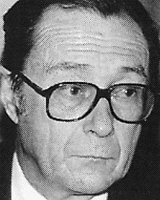
Pierre Aubert
Encyclopedia
Pierre Aubert is a Swiss
politician, lawyer and former member of the Swiss Federal Council
(1978–1987).
He was elected to the Swiss Federal Council
on 7 December 1977 as member of the Social Democratic Party
from the canton of Neuchâtel
. He handed over office on 31 December 1987. After a law degree, he became attoney-at-law in 1953. He began his political career as a member of the City Parliament of La Chaux-de-Fonds
(1960–68), the Cantonal Parliament of Neuchâtel (1961–75, its president in 1969/70). Elected to the Council of States in 1975, he sat is this chamber of the Federal Parliament until his election to the Federal Council in 1977. From 1974 to 1977, he belonged to the Parliamentary Assembly of the Council of Europe and was rapporteur for the admission of Portugal. He was also chancellor of the University of Neuchâtel from 1971 to 1977.
During his time in office, he held the Political Department in 1978 and from 1979 to 1987 after it was renamed to "Federal Department of Foreign Affairs". He was President of the Confederation twice: in 1983 and in 1987. He stood for a Swiss active policy in general and in the Human rights field in particular. Aubert visited four African countries and signed a declaration against apartheid in Nigeria in 1979. He was the first Swiss foreign minister to establish contacts with the PLO leadership when he received Faruk Kaddhumi in July 1980 in Bern. He led the unsuccessful campaign to join the United Nations in 1986 (only 24 % of the voters were in favour).
Switzerland
Switzerland name of one of the Swiss cantons. ; ; ; or ), in its full name the Swiss Confederation , is a federal republic consisting of 26 cantons, with Bern as the seat of the federal authorities. The country is situated in Western Europe,Or Central Europe depending on the definition....
politician, lawyer and former member of the Swiss Federal Council
Swiss Federal Council
The Federal Council is the seven-member executive council which constitutes the federal government of Switzerland and serves as the Swiss collective head of state....
(1978–1987).
He was elected to the Swiss Federal Council
Swiss Federal Council
The Federal Council is the seven-member executive council which constitutes the federal government of Switzerland and serves as the Swiss collective head of state....
on 7 December 1977 as member of the Social Democratic Party
Social Democratic Party of Switzerland
The Social Democratic Party of Switzerland is the largest centre-left political party in Switzerland....
from the canton of Neuchâtel
Canton of Neuchâtel
Neuchâtel is a canton of French speaking western Switzerland. In 2007, its population was 169,782 of which 39,654 were foreigners. The capital is Neuchâtel.-History:...
. He handed over office on 31 December 1987. After a law degree, he became attoney-at-law in 1953. He began his political career as a member of the City Parliament of La Chaux-de-Fonds
La Chaux-de-Fonds
La Chaux-de-Fonds is a Swiss city of the district of La Chaux-de-Fonds in the canton of Neuchâtel. It is located in the Jura mountains at an altitude of 1000 m, a few kilometres from the French border. After Geneva and Lausanne, it is the third largest city of Romandie, the French-speaking part of...
(1960–68), the Cantonal Parliament of Neuchâtel (1961–75, its president in 1969/70). Elected to the Council of States in 1975, he sat is this chamber of the Federal Parliament until his election to the Federal Council in 1977. From 1974 to 1977, he belonged to the Parliamentary Assembly of the Council of Europe and was rapporteur for the admission of Portugal. He was also chancellor of the University of Neuchâtel from 1971 to 1977.
During his time in office, he held the Political Department in 1978 and from 1979 to 1987 after it was renamed to "Federal Department of Foreign Affairs". He was President of the Confederation twice: in 1983 and in 1987. He stood for a Swiss active policy in general and in the Human rights field in particular. Aubert visited four African countries and signed a declaration against apartheid in Nigeria in 1979. He was the first Swiss foreign minister to establish contacts with the PLO leadership when he received Faruk Kaddhumi in July 1980 in Bern. He led the unsuccessful campaign to join the United Nations in 1986 (only 24 % of the voters were in favour).

